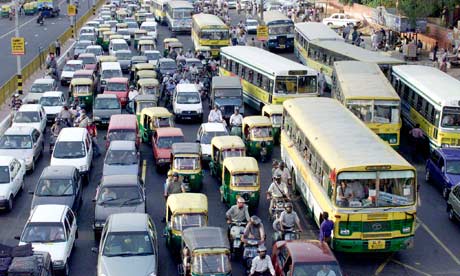Delhi plans congestion charge to ease gridlock
September 10, 2013
Warning: Undefined variable $thumb in /var/www/web/indiantollways.com/wp-content/plugins/digg-digg/include/dd-class.php on line 887
Drivers face 150 rupee (£2) fee to enter central areas after the number of cars on Indian capital’s
roads doubles in five years

No one could fault the plan for lack of ambition: to tame the choked streets of India’s
notoriously chaotic capital by imposing a congestion charge modelled on that in London,
Singapore and a handful of other cities.
The Municipal Corporation of Delhi, the authority charged with providing civic services
to the city, hopes to introduce a system to levy a 150-rupee (£2) fee on cars, motorbikes
and even rickshaws entering central areas during the day.
“This will help reduce congestion … [and] encourage people to use public transport,” the head
of the authority, KS Mehra, told local press. Lorries will be made to pay a higher fee.
A congestion charge has existed in Singapore since the 1970s and various systems have
been successfully introduced in London, Rome, Milan and several Scandinavian cities
in recent years.
Authorities in Beijing recently said they were considering congestion charging, and other
Chinese cities such as Shanghai and Nangjing are reported to be interested. But no city
of the size and complexity of Delhi has attempted to introduce such a scheme.
Few doubt the necessity of radical measures in India’s capital. Construction of a metro
system and measures to boost the use of buses has barely slowed the increase in traffic
in recent years. A decade of rapid economic growth and a broad distaste for public
transport among the expanding middle class means there are now 6.8m vehicles on
Delhi’s roads, at least twice as many as five years ago.
Gridlock is common and, during winter, heavy smog leads to accidents, respiratory
diseases and mass flight cancellations.
Other Indian cities such as Mumbai, the country’s commercial capital, are considering
similar measures. The Delhi scheme would first be implemented in areas around
the historical old centre.
But experts are sceptical. “If you look at what is already in place to reduce congestion,
such as toll gates around Delhi, they make the problem worse, not better,” said Rumi Aijaz,
of the city’s Centre for Policy Research thinktank. “Even if the proposal is accepted
politically, the necessary infrastructure simply isn’t there.”
The tolls on key roads linking Delhi with satellite cities cause huge traffic jams.
Occasionally they are the focus of protests that can turn violent. Aijaz said a broader
strategy to tackle traffic in the city was necessary. “There has to be a range of measures
to manage the issue. Nothing done in isolation will work,” he said.
Experts point out that one serious problem is a lack of proper licensing or law enforcement
in Delhi. Driving permits can be bought illegally and laws that should ensure safe driving
and a smoother traffic flow are routinely ignored.
Fines for traffic violations can usually be avoided by paying a small bribe to police officers.
There are few cameras, although a Facebook page asking irate commuters to post their
own photographs of offenders has met with a massive response.
Senior police officers said charging would be a positive step – if technology to avoid
queuing was introduced. But even if the practical obstacles can be overcome, the support
of the infamously fractious “delhiwalla” – inhabitants of the city – will be hard to win.
Some shopkeepers welcomed the move, but their customers were less enthusiastic.
“People are already reeling under taxes … we don’t need any more,” Mamta Choudhary,
a teacher who regularly shops in one of the areas designated for the new scheme,
told the Times of India newspaper.
Ram Thakur, a 45-year-old manager who spends up to two hours a day in traffic
driving from the satellite city of Faridabad to his office, said no amount of charging
would make him give up the small car that he bought a year ago. “I started on a bicycle
and I’ve taken buses for 20 years. Now I am a car owner and life is very much nicer.
I am not giving it up to go back on buses or bikes,” he told the Guardian.
Dr Robin Hickman, an expert in urban transport at London University, said that
implementing a congestion charge in Delhi would be “extremely difficult. “It would
probably be a better option to increase tax on fuel in the city and invest the funds
generated in public transport,” Hickman, who has worked in Delhi, said.






